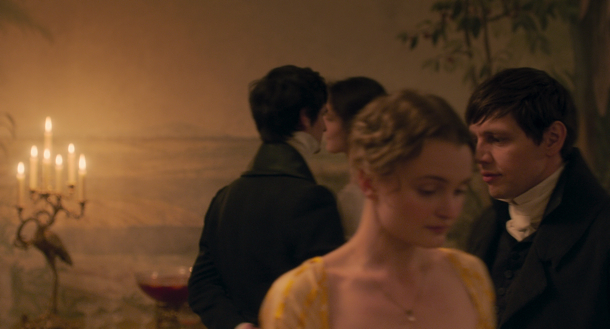
Dir.: Jessica Hausner
Cast: Birte Schnoeink, Christian Friedel, Sandra Hueller, Stephan Grossmann, Barbara Schnitzler
Austria/Luxembourg/Germany 2014, 98 min.
AMOUR FOU opens in 1811, in with a painterly image of a Berlin intellectual household listening to Mozart’s “Das Veilchen”, performed by a professional singer. This is a typical setting for the classic “Hausmusik” (musical salon) chez Friedrich (Grossmann) and Henrietta (Schnoeink) Vogel and their twelve-year old daughter Pauline. Significantly, one of their guests is the poet and playwright Heinrich von Kleist (Friedel). The latter is in love with death and has already asked his cousin Marie (Hueller) to ‘die with him’ as a expression of their mutual feelings; Hausner implying that she is not the first to be asked this question. Henrietta, who appears a contented and modest mother and wife, is next in line, and she vehemently denies any interest in a suicide pact. Later on, she falls ill; what seems to be at first just a psychosomatic symptom, turns out be terminal cancer, and von Kleist seems to have found a companion to die with at last. But the couple’s first try falls due von Kleist’s boorish and petty behaviour, before the poet makes a second attempt to inveigle Henrietta at the “Kleine Wannsee” into to his pathetic scheme, near Potsdam on November 11th 1811.
Hausner portrays von Kleist not very sympathetically: he comes over as egocentric and not at all romantic or even physically appealing. After Henrietta’s illness is diagnosed, von Kleist rejects her wish for a suicide pact and tries his luck again with the much more upper class Marie, who rejects him again as she is now betrothed to a Frenchman. Left with no alternative, Heinrich returns, apologetic, to Henrietta. Friedrich Vogel seems to be a much better person, really in love with his wife, even though he treats her (as was common at the time) like an infant daughter. The most unpleasant person in the Vogel household is certainly Henrietta’s mother, a bitter and resentful person, who seems to dislike everyone.
Hausner (Lourdes) succeeds not only in revealing Heinrich as a manipulator, she also indirectly answers a question many asked after WWII: how could such a culture-loving nation like Germany commit so many crimes against humanity. The answer can be found in AMOUR FOU, and in historical figures like von Kleist himself. Right after listening to Mozart, the discussion at the table turns to the new Prussian tax laws which, according to Friedrich Vogel, a government official, will set the peasants free as with taxation comes more freedom. The undemocratic argument at the middle class table was “one cannot give the lower classes the freedom to do what they wish, since they are not capable of making decisions”.
Whilst cultural appreciation went hand in hand with reactionary arguments at this level of society, on a higher level, the togetherness of culture and aggression led to continuous wars: Frederick the Great, who played many instruments, among them the flute to a semi-professional level, led the most bloody wars of his period, including the Seven-Year war (1756-1763). He was not by chance the idol of Adolf Hitler. And one should not forget that Heinrich von Kleist himself spend the years between 1792 and 1799 in the Prussian army, seeing action in the “Rhine” campaign and leaving with the rank of a lieutenant. Hausner shows clearly, that all characters in her narrative have an emotional deficit, and that von Kleist’s false romanticism is really a death wish, accompanied by the need to murder somebody else in the process. There is a direct line from von Kleist’s Wagnerian dream of destruction and self-destruction, to Ucicky’s U-boot film Morgenrot (premiered not accidently on the 2.2.1933) and his hero declaring: “We Germans might not know how to live but we certainly know how to die”.
Hausner sets AMOUR FOU in expertly-framed and sumptuously-lit tableaux, showing distance and analytical endeavour and giving us a formal yet exquisitely pleasurable impression of looking at pictures in an exhibition. Schnoeink’s Henrietta is vulnerable, but still caring. All the men, including the doctor who treats her, suffer from a total lack of empathy; Friedel’s von Kleist leading the field. The set design and general aesthetic underline the lack of any sensual enjoyment in life: the bedroom of the Vogel’s looking like a luxury prison cell. AMOUR FOU is a brilliant portrait of a society unable to be in touch with emotions or any kind of sensuality. The relationship between von Kleist and Henrietta is symbolic: there is no passion or love, just a quiet resignation and a desire for death.
ON GENERAL RELEASE FROM 6TH FEBRUARY 2015 | DVD from 5 March 2015